We may not have the course you’re looking for. If you enquire or give us a call on +357 26030221 and speak to our training experts, we may still be able to help with your training requirements.
We ensure quality, budget-alignment, and timely delivery by our expert instructors.
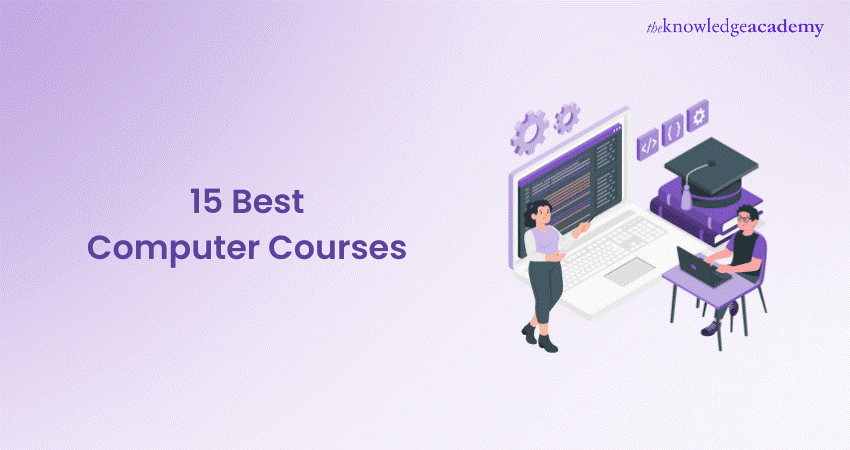
The digital age has transformed the job market, making Computer Science Skills more essential than ever. Whether you're a tech enthusiast or looking to switch careers, choosing the right Computer Course is crucial. In this blog, you will learn about the 15 Best Computer Courses in the market right now. It will also offer valuable insights to assist you in making the best choice for your career.
Table of Contents
1) Top 15 Computer Courses
a) Web Designing
b) Data Science
c) Multimedia and Animation
d) Internet of Things (IoT)
e) Cyber Security Analysis
f) Big Data Analytics
g) Digital Marketing
h) Software Development
i) Computer Hardware Engineering and Networking
j) Mobile App Development
2) Choosing the right Computer Course for career goals
3) Five best Computer Science roles
4) Conclusion
Top 15 Computer Courses
From Web Designing to Data Science, there are several courses available in the field of Computer Science. Let's take a look at the 15 Best Computers Courses here:
1) Web Designing
Web Designing is a dynamic and creative field that focuses on making visually appealing and functional websites. As more businesses and individuals increase their online presence, the demand for Web Designers will continue to grow.
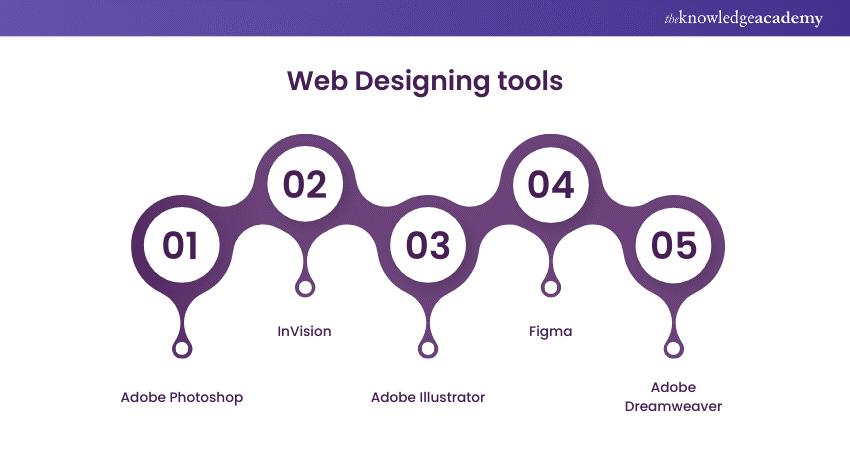
Web Designers are responsible for crafting the layout, colour schemes, typography, and interactivity of websites. They use tools like Adobe Photoshop, Illustrator, and Dreamweaver to bring their designs to life.
To excel in Web Designing, you'll need a strong grasp of HTML, CSS, and JavaScript, which are the core languages of web development. Beyond technical skills, a keen eye for design and aesthetics is crucial. Web Designers often work on User Interface (UI) and User Experience (UX) design, ensuring that websites are visually appealing and easy to navigate.
Career options: Web Designer, Web Developer, UI/UX Designer, Graphic Designer, Freelance Web Designer.
2) Data Science
Data Science is a multidisciplinary field that revolves around collecting, processing, and analysing large and complex datasets to extract valuable insights and patterns. It combines elements of statistics, mathematics, programming, and Machine Learning to help organisations make better decisions based on data.
Data Scientists are in high demand across various industries as businesses seek to harness the power of data-driven decision-making. To embark on a career in Data Science, a strong foundation in mathematics and statistics is necessary.
Besides, proficiency in programming languages like Python or R is also essential for data manipulation and analysis. Data Scientists should possess excellent analytical and problem-solving skills to derive meaningful insights from data.
Career options: Data Scientist, Data Analyst, Data Engineer, Machine Learning Engineer, Business Analyst.
3) Multimedia and Animation
Multimedia and Animation courses are a perfect blend of artistry and technical skills. These courses involve creating and manipulating images, sounds, videos, and other media elements to produce engaging and interactive content.
Multimedia and Animation professionals work in various industries, including entertainment, education, advertising, gaming, and more. To excel in this field, you'll need a basic knowledge of computer graphics and a strong sense of art and design.
Software tools like Adobe After Effects, Maya, and Blender are commonly used to bring creative visions to life. Multimedia and Animation Courses offer a wide scope of applications, and professionals in this field have the opportunity to unleash their creativity.
Career options: Animator, Multimedia Artist, Graphic Designer, Video Editor, Game Developer.
4) Internet of Things (IoT)
The Internet of Things is a cutting-edge field that connects physical objects, devices, and machines to the internet. This enables them to communicate and exchange data. IoT involves the use of sensors, microcontrollers, cloud computing, and networking technologies to create smart and interconnected systems.
This field holds huge potential for innovation and has applications in various domains, including healthcare, agriculture, transportation, and more. To excel in IoT, you'll need a basic understanding of electronics, programming, and networking.
IoT professionals are often tasked with creating intelligent systems that improve the quality of life and efficiency in various industries. With the continued growth of IoT, skilled professionals in this field are in high demand.
Career options: IoT Developer, IoT Engineer, IoT Architect, IoT Analyst, IoT Consultant.
5) Cyber Security Analysis
Cyber Security Analysis plays a vital role in safeguarding data, systems, and networks from unauthorised access, attacks, and threats. Cyber Security Analysts employ a range of techniques and tools, including encryption, authentication, firewalls, and antivirus software, to protect sensitive information. With the increasing frequency of cyberattacks, the requirement for these professionals is on the rise.
To pursue a career in Cyber Security Analysis, you'll need a good knowledge of computer systems, networks, and programming. Cyber Security Analysts must think like hackers to identify vulnerabilities and prevent potential breaches. Staying updated with the recent Cyber Security threats and countermeasures is essential in this constantly evolving field.
Career options: Cyber Security Analyst, Cyber Security Engineer, Cyber Security Consultant, Ethical Hacker, Penetration Tester.
6) Big Data Analytics
Big Data Analytics involves the processing and analysis of large and complex datasets that surpass the capacity of traditional data processing systems. This field uses techniques like distributed computing, Machine Learning, data mining, and data visualisation to uncover hidden patterns and insights from massive data.
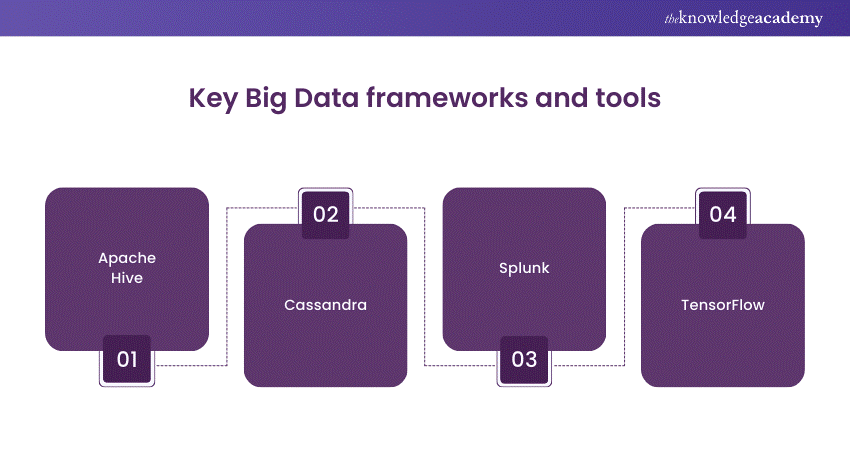
Big Data Analytics has far-reaching applications in industries like e-commerce, banking, healthcare, and more. To succeed in Big Data Analytics, you'll need a strong foundation in mathematics and statistics, along with proficiency in programming languages like Python, R, or Java. Big Data Analysts work with Big Data frameworks and tools, such as Hadoop and Spark, to handle and process vast amounts of data. Their insights drive informed decision-making in organisations.
Career options: Big Data Analyst, Big Data Engineer, Big Data Architect, Big Data Scientist, Big Data Consultant.
7) Digital Marketing
Digital Marketing involves the promotion and sale of products or services through digital channels like websites, social media, email, search engines, and more. It encompasses various strategies and techniques, including Search Engine Optimization (SEO), Search Engine Marketing (SEM), Social Media Marketing (SMM), Email Marketing, and Content Marketing. With businesses shifting to online platforms, Digital Marketing Skills are highly sought after.
To excel in Digital Marketing, you'll need a solid understanding of marketing concepts and principles. Creativity and strategic thinking are essential, as Digital Marketers aim to engage target audiences and convert them into customers.
Familiarity with digital marketing tools and platforms, such as Google Analytics and Google Ads, is crucial for measuring and optimising campaign performance.
Career options: Digital Marketer, SEO Specialist, SEM Manager, Social Media Manager, Content Marketer.
Unleash the power of Digital Marketing with our Digital Marketing Masterclass – Sign up now!
8) Software Development
Software Development is the process of designing, developing, testing, and maintaining software applications and systems that run on various devices and platforms. It encompasses stages like planning, analysis, design, implementation, testing, and deployment.
Software Developers are the backbone of the tech industry, responsible for creating software solutions that solve problems, automate tasks, enhance productivity, and provide functionality.
To thrive in Software Development, you'll need a strong foundation in computer science and logic, along with proficiency in programming languages like C, C++, Java, Python, or others, depending on your chosen domain.
Software Development demands a systematic and disciplined approach. Moreover, developers often work with a range of tools and frameworks to create and maintain software products.
Career options: Software Developer, Software Engineer, Software Tester, Software Architect, Software Consultant.
9) Computer Hardware Engineering and Networking
Computer Hardware Engineering and Networking involve the design, development, installation, maintenance, and troubleshooting of the physical components and connections of computer systems and networks.
This field encompasses devices like processors, memory, storage, motherboards, routers, switches, and cables. Computer Hardware Engineers and Network Specialists ensure the smooth operation of IT infrastructure.
To excel in this field, you'll need a strong understanding of the latest computer hardware technologies and networking protocols. Computer Hardware Engineers can design and build computer components, while Network Specialists configure, secure, and optimise network environments.
Career options: Computer Hardware Engineer, Network Technician, Network Administrator, Network Consultant.
10) Mobile App Development
Mobile App Development focuses on creating software applications specifically designed for mobile devices, such as smartphones and tablets. With the widespread use of mobile technology, this field has seen exponential growth. Mobile App Developers design, code, test, and deploy applications that run on various platforms, including Android and iOS.
To succeed in Mobile App Development, you'll need proficiency in programming languages like Java, Kotlin, Swift, or React Native, depending on the platform you choose. Familiarity with mobile app development tools, integrated development environments (IDEs), and app stores' submission processes is essential.
Mobile App Developers also need to keep up with the latest mobile technologies and design trends to create user-friendly and high-performance applications.
Career options: Mobile App Developer, Mobile App Tester, Mobile App Designer, Mobile App Consultant, Freelance Mobile App Developer.
11) Graphic Designing
Graphic Designing is a creative field that involves creating visual content for various purposes, including branding, advertising, marketing, and web design. Graphic Designers use their artistic skills and digital tools, such as Adobe Photoshop, Illustrator, InDesign, and CorelDRAW, to craft eye-catching designs that communicate messages effectively.
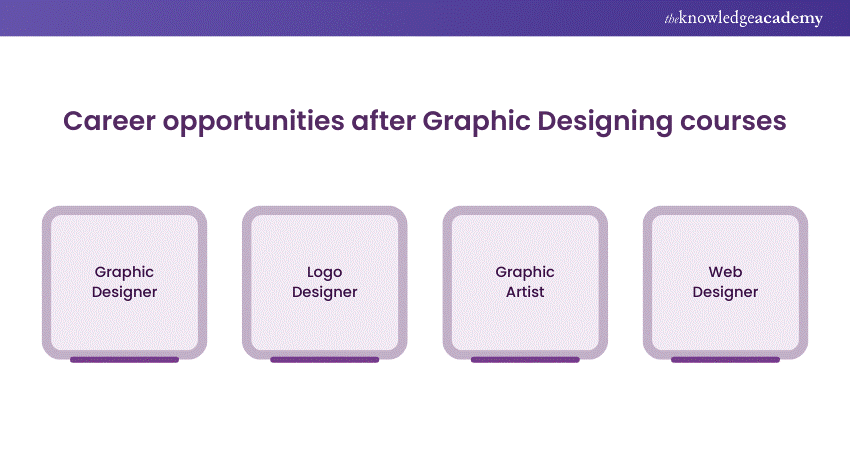
To excel in Graphic Designing, you'll need a strong sense of aesthetics, color theory, typography, and layout design. Creativity is at the core of this profession, as Graphic Designers often work on creating logos, brochures, posters, infographics, and website graphics. Collaboration with clients or creative teams is common, and designers must translate ideas into visually compelling designs.
Career options: Graphic Designer, Graphic Artist, Logo Designer, Web Designer, Freelance Graphic Designer.
12) Big Data Engineering
Big Data Engineering involves designing and maintaining the infrastructure and systems required to handle, process, and store massive volumes of data. It focuses on building scalable and efficient data pipelines using technologies like Hadoop, Spark, Kafka, and NoSQL databases. Big Data Engineers ensure that data is available and accessible for analysis by data scientists and analysts.
To thrive in Big Data Engineering, you'll need a strong background in data architecture, distributed computing, and data warehousing. Proficiency in programming languages like Java, Python, Scala, or SQL is crucial for building data processing pipelines. Big Data Engineers collaborate with data scientists and analysts to ensure that data is ingested, transformed, and stored efficiently for analysis.
Career options: Big Data Engineer, Big Data Architect, Big Data Developer, Big Data Administrator, Big Data Consultant.
13) Data Analytics
Data Analytics involves the examination of data to identify trends, patterns, and insights that can inform decision-making. Data Analysts use statistical analysis, data visualisation, and data mining techniques to extract meaningful information from datasets. They play a crucial role in helping organisations make informed choices based on data-driven insights.
To succeed in Data Analytics, you'll need strong analytical and problem-solving skills, as well as proficiency in tools like Microsoft Excel, SQL, Tableau, or Power BI. Data Analysts work with various data sources, including spreadsheets, databases, and Big Data platforms. They communicate their findings effectively to stakeholders and often collaborate with data scientists and engineers to extract valuable insights.
Career options: Data Analyst, Data Scientist, Data Engineer, Business Analyst, Data Consultant.
14) Artificial Intelligence and Machine Learning
Artificial Intelligence (AI) and Machine Learning (ML) are cutting-edge fields that focus on creating intelligent systems capable of learning from data and making decisions. These technologies have applications in a wide range of industries, including healthcare, finance, autonomous vehicles, and Natural Language Processing (NLP).
To excel in AI and ML, you'll need a strong foundation in mathematics, statistics, and computer science. Proficiency in programming languages like Python and familiarity with Machine Learning libraries like TensorFlow and PyTorch are essential. AI and ML Engineers work on tasks such as developing recommendation systems, image recognition, and Natural Language Processing applications.
Career options: AI Engineer, Machine Learning Engineer, Data Scientist, AI Researcher, AI Consultant.
15) Information Technology (IT)
Information Technology (IT) professionals play a crucial role in managing computer systems, networks, and technology infrastructure within organisations. They ensure that data is securely stored, processed, and transmitted, and they troubleshoot hardware and software issues to maintain a smooth IT environment.
To excel in IT, you'll need a strong understanding of computer systems, networks, and Cyber Security principles. IT professionals often hold certifications like CompTIA A+, Network+, or Security+ to demonstrate their expertise. They work in roles ranging from IT support and administration to IT management, and their skills are in demand across various industries, including finance, healthcare, education, and more.
Career options: IT Engineer, IT Technician, IT Administrator, IT Manager, IT Consultant.
These top 15 Computer Courses offer a diverse range of career opportunities for individuals interested in the ever-evolving field of technology. Depending on your interests, strengths, and career goals, you can choose a course that aligns with your aspirations. Keep in mind that the tech industry is dynamic, and continuous learning and adaptability are essential for long-term success in these fields.
Choosing the right Computer Course for career goals
Selecting the ideal Computer Course that aligns with your career objectives is a crucial decision that requires thoughtful consideration. Here's a helpful guide to assist you in making an informed choice:
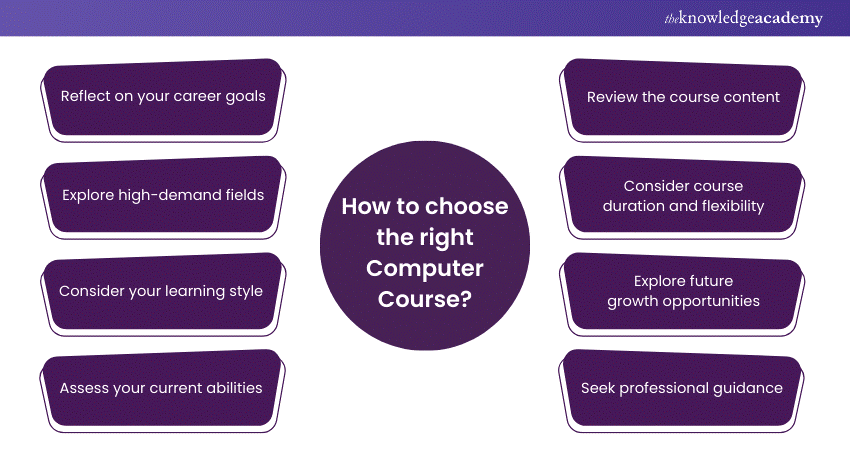
1) Reflect on your career goals: Begin by clearly defining your career aspirations and objectives. What specific roles or industries are you passionate about? Identifying your goals will provide you with a clear direction when choosing a Computer Course.
2) Explore high-demand fields: Research the job market to discover which fields are currently in high demand. Courses related to areas experiencing growth and opportunities, such as data science, Cyber Security, and software development, are often excellent choices.
3) Consider your learning style: Take your preferred learning style into account. Do you thrive in a structured classroom setting, or do you prefer the flexibility of self-paced online courses? Opt for a course format that aligns with your learning preferences and schedule.
4) Assess your current abilities: Evaluate your existing skills and knowledge in your chosen field. Some courses may require a strong foundation in specific areas, while others cater to beginners. Ensure you meet the prerequisites for your selected course to make the learning experience more effective.
5) Review the course content: Thoroughly examine the course curriculum. Does it cover the topics and skills necessary to achieve your career goals? Look for courses that include practical, hands-on projects and assignments to enhance your expertise.
6) Consider course duration and flexibility: Take into consideration the length and flexibility of the course. Some courses are intensive and short-term, while others are more extended and flexible. Choose a course that fits your available time and schedule.
7) Explore future growth opportunities: Examine how the course can open doors to future career growth. Does it lead to advanced certifications or opportunities for specialisation? Ensure your chosen course offers a clear path for career progression.
8) Seek professional guidance: Consult with professionals or career advisors in your desired field. Their insights and recommendations, based on industry trends and your career goals, can be invaluable in making the right choice.
Master Agile Software Development with our Agile Software Development Training – Sign up now!
Five best Computer Science roles
Completing any of the 15 Best Computer Courses mentioned above opens the doors to a multitude of rewarding Computer Science roles. Here are five of the best options:
1) Data Scientist
Data Scientists play a pivotal role in extracting meaningful insights from complex data sets. They employ statistical analysis, Machine Learning, and data visualisation techniques to help organisations make data-driven decisions. Data Scientists are in high demand across various industries, including finance, healthcare, and e-commerce.
2) Software Developer
Software Developers are the architects behind applications and systems used on computers, smartphones, and other devices. They design, code, and maintain software solutions, making them essential in a technology-driven world. Software Developers find opportunities in software companies, startups, and virtually every industry that relies on technology.
3) Systems Analyst
Systems Analysts bridge the gap between technology and business needs. They assess an organisation's IT systems, identify improvements, and recommend solutions that enhance efficiency and productivity. Systems Analysts often work in diverse industries, contributing to streamlined operations.
4) Cyber Security Analyst
Cyber Security Analysts are guardians of digital security, responsible for safeguarding sensitive data and systems from cyber threats. They employ a range of techniques and tools to detect and respond to security breaches. The increasing frequency and sophistication of cyberattacks have elevated the demand for skilled Cyber Security Analysts.
5) AI Engineer
AI Engineers are at the forefront of Artificial Intelligence and Machine Learning. They design and develop systems that can perform tasks requiring human-like intelligence, such as Natural Language Processing and computer vision. AI Engineers find opportunities in fields like healthcare, education, and autonomous vehicles.
These computer science roles offer diverse career paths and opportunities for specialisation. Depending on your interests and the course you pursue, you can embark on a fulfilling journey in one of these dynamic fields.
Conclusion
We hope you read and understand this blog on “15 Best Computer Courses”. Choosing a Computer Course is a significant step towards a successful career in the tech industry. By understanding your goals, assessing market demands, and evaluating course content, you can make an informed decision. Stay updated, and the ever-evolving world of technology will offer exciting opportunities.
Transform your career trajectory with our Career Development Masterclass – Sign up now!
Frequently Asked Questions

Certifications can enhance your credibility and job prospects in the field of Computer Courses. They validate your skills and knowledge, making you a more attractive candidate to potential employers.

To stay current with the ever-evolving world of Computer Courses, consider subscribing to industry newsletters, following reputable tech websites, participating in online forums, and networking with professionals in your field. Continuous learning and engagement are key to staying informed and competitive.

The Knowledge Academy takes global learning to new heights, offering over 3,000 online courses across 490+ locations in 190+ countries. This expansive reach ensures accessibility and convenience for learners worldwide.
Alongside our diverse Online Course Catalogue, encompassing 19 major categories, we go the extra mile by providing a plethora of free educational Online Resources like News updates, Blogs, videos, webinars, and interview questions. Tailoring learning experiences further, professionals can maximise value with customisable Course Bundles of TKA.

The Knowledge Academy’s Knowledge Pass, a prepaid voucher, adds another layer of flexibility, allowing course bookings over a 12-month period. Join us on a journey where education knows no bounds.

The Knowledge Academy offers various Personal Development Courses, including Career Development Masterclass, Time Management Training, and Agile Software Development Training. These courses cater to different skill levels, providing comprehensive insights into Business Skills methodologies.
Our Business Skills blogs cover a range of topics related to Administrative Assistant, offering valuable resources, best practices, and industry insights. Whether you are a beginner or looking to advance your Business Skills, The Knowledge Academy's diverse courses and informative blogs have you covered.
Upcoming Business Skills Resources Batches & Dates
Date
 Data Science and Blockchain Training
Data Science and Blockchain Training
Fri 7th Feb 2025
Fri 4th Apr 2025
Fri 6th Jun 2025
Fri 8th Aug 2025
Fri 3rd Oct 2025
Fri 5th Dec 2025







 Top Rated Course
Top Rated Course



 If you wish to make any changes to your course, please
If you wish to make any changes to your course, please


